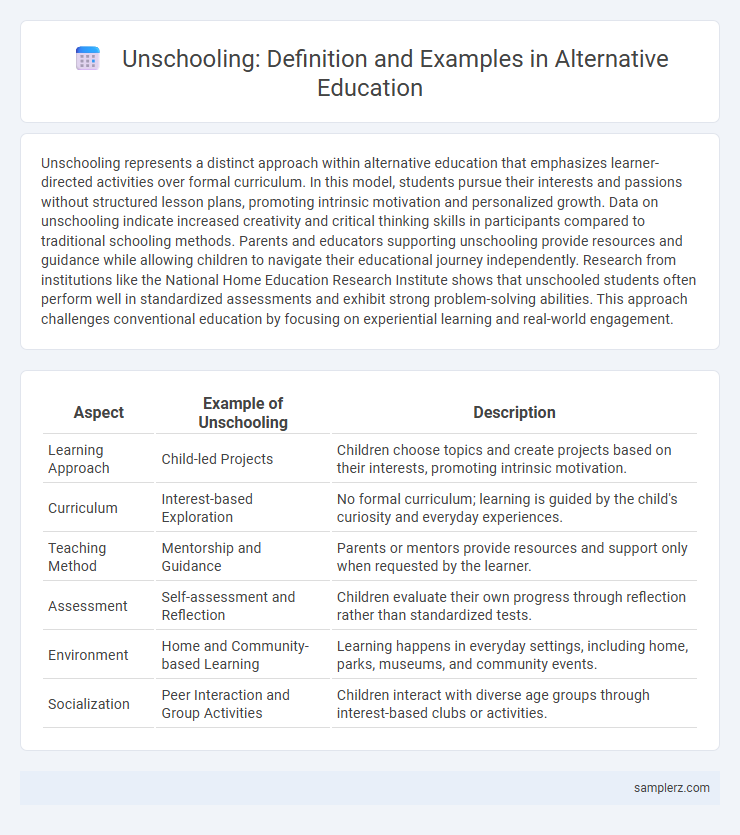Unschooling represents a distinct approach within alternative education that emphasizes learner-directed activities over formal curriculum. In this model, students pursue their interests and passions without structured lesson plans, promoting intrinsic motivation and personalized growth. Data on unschooling indicate increased creativity and critical thinking skills in participants compared to traditional schooling methods. Parents and educators supporting unschooling provide resources and guidance while allowing children to navigate their educational journey independently. Research from institutions like the National Home Education Research Institute shows that unschooled students often perform well in standardized assessments and exhibit strong problem-solving abilities. This approach challenges conventional education by focusing on experiential learning and real-world engagement.
Table of Comparison
| Aspect | Example of Unschooling | Description |
|---|---|---|
| Learning Approach | Child-led Projects | Children choose topics and create projects based on their interests, promoting intrinsic motivation. |
| Curriculum | Interest-based Exploration | No formal curriculum; learning is guided by the child's curiosity and everyday experiences. |
| Teaching Method | Mentorship and Guidance | Parents or mentors provide resources and support only when requested by the learner. |
| Assessment | Self-assessment and Reflection | Children evaluate their own progress through reflection rather than standardized tests. |
| Environment | Home and Community-based Learning | Learning happens in everyday settings, including home, parks, museums, and community events. |
| Socialization | Peer Interaction and Group Activities | Children interact with diverse age groups through interest-based clubs or activities. |
Understanding Unschooling: A Fundamental Shift in Education
Unschooling represents a fundamental shift in education by prioritizing child-led learning over traditional curricula, allowing students to explore subjects based on their interests and natural curiosity. This approach fosters intrinsic motivation, creativity, and critical thinking, rejecting standardized tests and rigid schedules. Key examples include families who tailor daily activities around real-life experiences and community resources rather than formal classroom instruction.
Core Principles Guiding Unschooling Practices
Unschooling in alternative education emphasizes learner-led experiences where curiosity and interests direct the educational journey, fostering intrinsic motivation and personalized learning paths. Core principles guiding unschooling practices include trust in the child's ability to manage their own learning, flexibility without fixed curricula, and the integration of real-world activities that promote critical thinking and problem-solving skills. This approach prioritizes autonomy, creativity, and holistic development over standardized assessment methods.
Real-Life Success Stories from Unschooling Families
Unschooling families like the Keys and the Sullivans demonstrate how personalized, interest-driven learning fosters critical thinking and creativity outside formal classrooms. These families report their children excelling in entrepreneurship, technology, and the arts, highlighting real-life outcomes of self-directed education. Research on unschooling outcomes also shows higher adaptability and problem-solving skills among students who pursue this alternative education method.
Unschooling vs. Traditional Homeschooling: Key Differences
Unschooling emphasizes child-led learning driven by interests and real-world experiences, contrasting with traditional homeschooling's structured curriculum and scheduled lessons. This approach fosters autonomy and intrinsic motivation, while traditional homeschooling often relies on standardized educational materials and assessments. Research indicates unschooling can enhance creativity and problem-solving skills by encouraging exploration beyond formal subjects.
Personalized Learning Paths in Unschooling Environments
Unschooling environments foster personalized learning paths by allowing students to explore subjects based on their interests and curiosities rather than a fixed curriculum. This approach supports self-directed learning where knowledge acquisition is driven by intrinsic motivation, enabling learners to develop critical thinking and problem-solving skills tailored to their needs. Personalized learning in unschooling leads to deeper engagement and a more meaningful educational experience compared to traditional standardized methods.
Facilitating Self-Directed Learning Through Unschooling
Unschooling empowers learners to take full control of their education by allowing them to pursue interests at their own pace without a formal curriculum. This approach encourages curiosity-driven exploration and hands-on experiences, fostering intrinsic motivation and critical thinking skills. Parents and facilitators support the process by providing resources and guidance tailored to individual learning styles, promoting lifelong self-directed learning habits.
Role of Parents and Mentors in the Unschooling Model
Parents and mentors in the unschooling model act as facilitators rather than traditional instructors, guiding children's interests and providing resources tailored to their learning styles. This approach emphasizes personalized learning experiences, where adults support curiosity-driven exploration without imposing structured curricula. The active involvement of parents and mentors fosters independence, critical thinking, and lifelong learning skills in students within this alternative education framework.
Socialization and Community Engagement in Unschooling
Unschooling emphasizes socialization through organic interactions within diverse community settings rather than structured classroom environments. Children engage in local clubs, volunteer organizations, and family-led projects, fostering real-world communication and collaboration skills. This approach nurtures social development by embedding learning in authentic social contexts, promoting empathy and civic responsibility.
Challenges and Criticisms of Unschooling in Alternative Education
Unschooling faces challenges such as lack of standardized assessment, which can lead to gaps in foundational knowledge essential for higher education and employment. Critics argue that unschooling may result in social isolation due to limited interaction with diverse peer groups and insufficient exposure to structured social environments. The absence of a formal curriculum raises concerns about accountability and the ability to meet educational benchmarks recognized by traditional institutions.
Future Prospects for Unschooling within Educational Innovation
Unschooling, an alternative education model emphasizing self-directed learning, is gaining traction as personalized education technologies and adaptive learning platforms evolve. Research indicates that learners in unschooling environments develop strong critical thinking and problem-solving skills, which align with future workforce demands. Integration of unschooling principles into mainstream curricula could drive educational innovation by fostering creativity and lifelong learning habits.

example of Unschooling in alternative education Infographic
 samplerz.com
samplerz.com